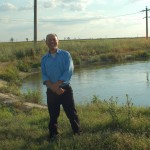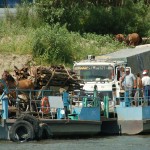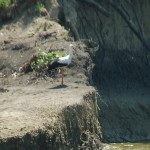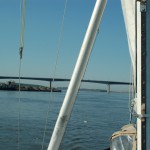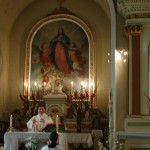The customs officer had promised to clear me out of Bulgaria at 6 a.m. yesterday morning. Now, why was I not surprised when he never showed up. After lots of rubber stamps and having to come to his office after all, the border police, customs, harbor officials had me on my way at 8.30. The wind blew hard right on the dock till mid night, I’d say 25/30 knots. Then I still had a nice following breeze all day, but it just was impossible to set a sail. I had to sometimes make a 90 degree turn to avoid a shallow and then recross the Danube to the other side. Then about an hour down stream from Silistra I entered the Bala- Burcea side arm of the Danube. Boiko, in Rouse, had told me that it was the only way to go because the main Danube stream would be too shallow. It is also a shortcut. It was narrower and there was hardly a channel marker to search for because the river was deep from shore to shore, instead of the much wider Danube with lots of shallows, islands, etc. It ran for about a 100 k.m. There is hardly any human activity on it’s shores, like villages, ship yards, etc. Just forested shores. I was able to photograph a stork on the shore. I saw one white tailed Eagle.
The wind picked up from the N.W. and the river ran mostly in the opposite direction so I was preoccupied on how I would be able to anchor for the night. Then just before the side arm rejoined the Danube there was a pumping station on the shore. I asked if I could tie up to them. Yes. The pumping station is a pontoon, see below picture, that pumps water to the rice fields, into an irrigation canal. This originated from the last years of the Ceausescu regime. Then after the fall of communism, in 1986, the rice fields and the irrigation sort of were abandoned, then two Italians came and invested in the rice growing and bought the irrigation system. The pumps are powered by large electrical motors. The electrical engineer for the maintenance yesterday evening happened to be Giorgio/George or the nick name GiGi. He spoke good English. Self taught by Voice of America and audio courses. Great guy. He showed me the system and the rice fields. It was like being back in the Sacramento delta. He lives in the village right at the last bridge over the Danube, at the confluence of the Danube and the Burcea. I asked him to try and take some pictures of “Fleetwood” going through the bridge. I put the main up for the occasion. As soon as I receive them from him they will be on the blog.
Braila was described in the 1925 “Sailing acroos Europe” book as the place where they saw ocean going vessels again for the first time, from many European ports. The ocean going vessels have outgrown the size of this river port but they do built ocean going ships here just as they do in Galati, which has the large Dutch owned Damen yard. Galati will be my next stop, tomorrow or Monday morning. It is just a couple hours down stream. I plan to try an replace my busted Teak toe rail in Galati. After Galati here is just one more stop in Dulcea before I enter the Black Sea. I could have easily made it to Galati but the book tells me that Braila is a prettier and more intersting city. Galati was almost entirely destroyed by the Germans in the second world war and has been rebuilt as a modern industrial town. I am moored against a big river boat/restaurant. It is free. I managed to clear into Romania, but I had to explaining to do since I had not been able to clear out of Zimnicea or San Giurgu.
With a little imagination you can picture Braila in the early 1900 as a a very cosmopolitan town, in the style of Vienna and Budapest. But most of the buildings are in very sad shape. I searched for the Roman Catholic Church to see what time mass would be tomorrow. And just as I found it the bells were ringing for the 6 p.m. Saturday evening mass. So, I have done my duty. Pretty little church. Much of the liturgy was sung and it was very melodious. And even though there were few people, for this mass, practically every one participated in the singing. I could understand more of it than the Bulgarian.

